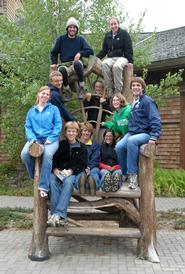
Students in the College 220 course "Natural and Cultural Histories of the Adirondacks," taught by the Silas D. Childs Professor of Chemistry Professor Robin Kinnel, traveled through the Adirondacks on Sept. 20. The group hiked in an old growth forest site along Powley Piseco Road in the Ferris Lake Wild Forest, visited the gravesite and cabin of abolitionist John Brown in North Elba, and ascended the top of Whiteface Mountain. They spent the night at Camp Wenonah as guests of James Schoff '68 and his wife Anne. The students included James Beslity'11, Jeff Chandler '11, Lindsay Getman '10, Cassidy Jay '11, Molly Kane '09, Leila Malcom '10, Andrew Pape '10, Kevin Rowe '10, Jen Santoro '11 and Travis Tomaselli '11. The class was accompanied by Professor Ernest Williams, and the group was joined at Camp Wenonah by Director of the Writing Center Sharon Williams and Professors Onno Oerlemans and Sally Cockburn.
In the evening the students heard a "case" of a classic confrontation between the Adirondack Park Agency (APA) and a private landowner over a building permit. The landowners were represented by Melissa Lescault, a lawyer in the Glens Falls firm of McPhillips, Fitzgerald & Cullum, who had represented them in the real case. Arguing for the APA was Dennis Phillips of the same firm and a long time friend of the Schoffs. Also contributing were Ross Whaley, former chair of the APA and Philip Terrie, author of Contested Terrain, one of the texts used in the course. The students served as the jury and, after spirited discussion of the complex issues involved, offered their judgment on the case.
Once their verdict was delivered, Lescault and Phillips revealed the real outcome of the case, which differed from the students' judgment and engendered another round of lively discussion. The following day the class toured the Natural History Museum of the Adirondacks (the WILD Center) at Tupper Lake and the Adirondack Museum at Blue Mountain Lake.
In the evening the students heard a "case" of a classic confrontation between the Adirondack Park Agency (APA) and a private landowner over a building permit. The landowners were represented by Melissa Lescault, a lawyer in the Glens Falls firm of McPhillips, Fitzgerald & Cullum, who had represented them in the real case. Arguing for the APA was Dennis Phillips of the same firm and a long time friend of the Schoffs. Also contributing were Ross Whaley, former chair of the APA and Philip Terrie, author of Contested Terrain, one of the texts used in the course. The students served as the jury and, after spirited discussion of the complex issues involved, offered their judgment on the case.
Once their verdict was delivered, Lescault and Phillips revealed the real outcome of the case, which differed from the students' judgment and engendered another round of lively discussion. The following day the class toured the Natural History Museum of the Adirondacks (the WILD Center) at Tupper Lake and the Adirondack Museum at Blue Mountain Lake.
Posted September 23, 2008
